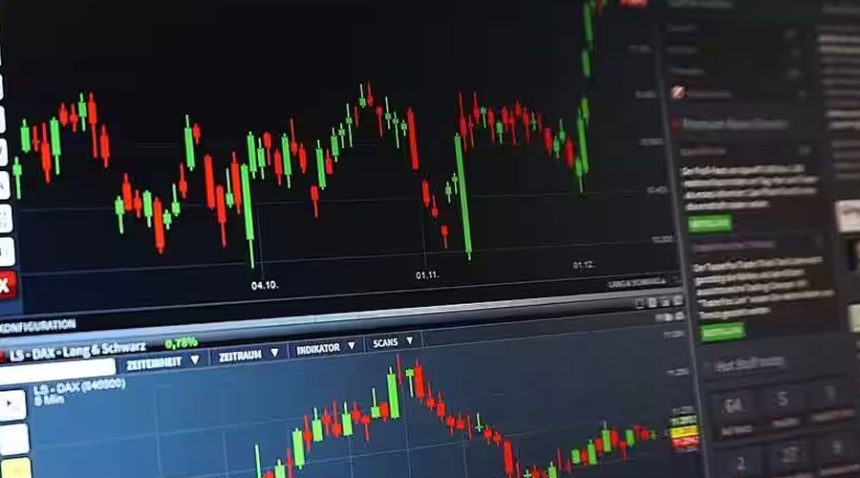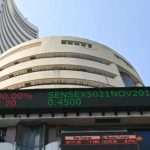The BSE Sensex opened at 76,153.68 and dropped by 0.61% during the session
The Indian stock market witnessed sharp movements on April 3, 2025, after fresh trade tensions between India and the United States triggered a wave of selling across major indices. The announcement of new U.S. tariffs on Indian imports jolted investor confidence, dragging benchmark indices lower. However, select sectors like pharmaceuticals defied the broader market trend and delivered solid gains.
Benchmark Indices: Sensex and Nifty End Lower
The BSE Sensex opened at 76,153.68 and dropped by 0.61% during the session. The Nifty 50 also mirrored the decline, slipping by 0.60% and opening at 23,192.40. Investors sold stocks across sectors due to renewed fears of a potential trade war after the U.S. President announced a 26% tariff on Indian goods, alongside a 34% tariff on Chinese imports beginning April 9.
Market participants quickly reacted to these developments and reduced their exposure to global-facing sectors. Selling pressure intensified in sectors such as IT, automobiles, and metals, which have direct exposure to global markets.
Pharmaceutical Stocks Rally on Tariff Exemption
While most sectors struggled, the pharmaceutical sector emerged as the day’s strongest performer. The Nifty Pharma index surged nearly 5%, marking its biggest intraday gain in more than four years. Pharmaceutical products secured exemption from the U.S. tariffs, which boosted investor confidence in pharma exporters.
Dr. Reddy’s Laboratories led the rally with a 6% gain. Strong U.S. market presence and diversified product portfolio supported buying interest.
Gland Pharma registered an impressive 8.5% increase. Investors viewed the company as a major beneficiary due to its contract manufacturing ties with U.S.-based firms.
Cipla added 4.5%, while Sun Pharma rose by 5.5% as the Street rewarded their regulatory compliance and U.S. market exposure.
Investors shifted their focus to healthcare and pharma companies due to their strategic insulation from trade-related volatility. The strong outlook for generic exports also lifted the broader mood in this sector.
IT Sector Faces Pressure on Global Concerns
The Nifty IT index slumped 3% as concerns mounted over export demand and potential U.S. regulation. Companies such as Persistent Systems and Coforge bore the brunt of selling pressure. Traders booked profits in large-cap IT stocks over fears of reduced outsourcing budgets and disruptions in tech exports.
Currency volatility further dented investor appetite for IT names, as the rupee remained volatile against the dollar. Market experts highlighted that IT earnings could remain under pressure if the U.S. adopts more restrictive trade policies.
Auto Sector Struggles on Demand Uncertainty
Automobile stocks underperformed due to the 26% tariff on Indian automotive exports to the U.S. The policy shift raised concerns over pricing, demand erosion, and profit margins in overseas markets.
Major auto exporters including Tata Motors, Bajaj Auto, and TVS Motor witnessed sharp intraday losses. Traders feared price hikes in export markets would hurt competitiveness. Analysts expect export volumes to dip in the coming quarters if the tariffs remain unchanged.
Domestic demand also showed signs of softening as consumers awaited clarity on vehicle prices and regulatory changes. Auto stocks faced resistance at key technical levels as investors trimmed positions.
Broader Market Breadth Turns Negative
The market breadth remained negative throughout the session. The NSE recorded more than 1,100 declining stocks versus just 700 advancing ones. Midcap and small-cap indices also closed lower, with higher selling in high-beta counters.
Sectors such as metals, FMCG, and real estate registered moderate losses, while energy stocks remained flat. Market participants reduced exposure to interest rate-sensitive and globally-linked sectors in anticipation of higher volatility.
Analysts Flag Broader Growth Concerns
Market strategists and analysts flagged serious concerns about global growth prospects due to the new round of tariffs. According to research desks, the U.S. tariffs appeared steeper than expected and raised the risk of retaliatory measures from affected countries.
Economists projected a possible slowdown in global trade flows. Such a scenario could dent earnings of Indian exporters, disrupt supply chains, and increase uncertainty over GDP growth. Valuations in the Indian market could come under pressure if earnings estimates undergo downward revisions in the coming quarters.
FIIs Turn Net Sellers
Foreign institutional investors (FIIs) turned net sellers in Thursday’s trade. The renewed trade tensions and stronger dollar prompted outflows from emerging markets, including India. Domestic institutional investors (DIIs), on the other hand, supported the market with selective buying in defensives and healthcare.
Market watchers expect foreign inflows to remain volatile until the global trade outlook becomes clearer. Geopolitical events and U.S. policy moves will likely dictate short-term market direction.
Rupee and Bond Market
The Indian rupee weakened against the U.S. dollar due to capital outflows and increased demand for safe-haven currencies. The rupee opened at 83.56 per dollar and remained under pressure throughout the day.
Bond yields inched higher as traders priced in potential inflationary pressures from imported goods and commodities. The 10-year benchmark yield stood at 7.21% by the end of the trading session.
Outlook for Friday
Analysts expect the market to remain rangebound in the near term. Traders will track global cues, U.S. economic data, and further announcements from the Indian government regarding possible countermeasures. Market participants will also keep an eye on crude oil prices and rupee movements.
Technical charts show key support for Nifty at 23,000, while resistance stands at 23,400. A break below support could trigger additional short-term selling. However, strong buying in select defensive sectors may offer opportunities for bottom-fishing.
The Indian stock market closed lower on April 3, 2025, as the announcement of steep U.S. tariffs triggered a sell-off in most sectors. Sensex and Nifty declined over half a percent each. Pharma stocks rallied after avoiding tariffs, while IT and auto stocks suffered due to global exposure. Broader market sentiment remained cautious as investors reacted to geopolitical developments. Analysts warned of further volatility and advised sector-specific investment strategies in light of changing global trade dynamics.






